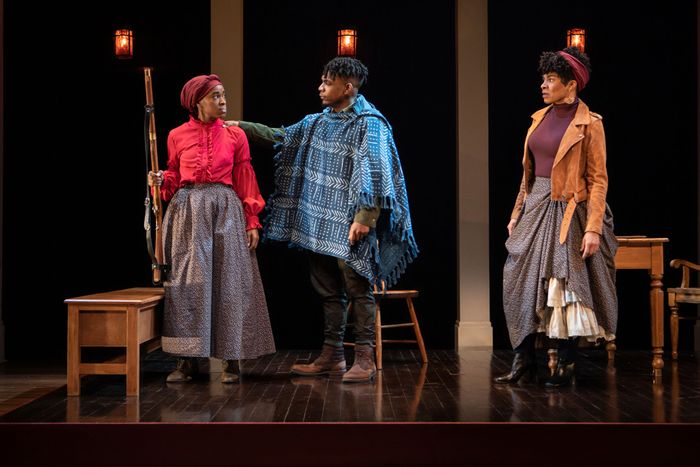
The first thing we see in Dominique Morisseau’s new play Confederates is a century-old photograph of a breastfeeding woman. It’s important enough that we’ll see this slide several times during the play, and even after the show, Signature Theatre workers will hand us a short note explaining where they got the archival image. Instead of arranging a curtain call (the actors never bow), as we walk out of the theater, projection designer Kate Freer turns our attention back to the photo’s subject — an African wet nurse, sitting with a white infant at her breast. In her note, Freer asks the subject for permission to use her picture. The woman is long gone, so Freer has to imagine her consent — in a history so full of gaps, coercion, and disappearance, a pretended connection is better than none at all.
The person who shows us the slide first is Sandra (Michelle Wilson), a Black political-science professor who has just found a version of it — Photoshopped with her own face — posted to her door. She insists the university investigate. The play then shifts abruptly to the 1860s, where the enslaved Sara (Kristolyn Lloyd, tremendous) is sewing up a wound on her runaway brother Abner (Elijah Jones), before she smuggles him and his new Union soldier’s uniform out of her cabin. In an instant, Abner pivots, doffs his cap to reveal a modern haircut and becomes Malik, one of Sandra’s students, who is fighting to raise his grade. The show toggles swiftly between Sandra’s life and Sara’s, the actors in one storyline tossing away their bustles or headwraps to become characters in the other. Rachel Hauck’s clever design, a spare white-pillared portico, recalls both plantation and the quad, and Ari Fulton’s costumes begin the play by keeping the periods carefully separate, but as the text starts to melt the time-barrier, so do the clothes.
Portentously, Malik’s paper is about the links between what he calls the “modern-day plantation” of corporate America and the antebellum South. Morisseau sees connections, too. Abner doubts that a woman can aid the war, and Malik clearly chafes at his professor’s feminism. Sara’s ditzy young mistress Missy Sue (Kenzie Ross) has abolitionist plans, which she wants Sara to carry out, and Sandra’s bubbly office assistant Candice (also Ross) conducts a similar kind of sabotage disguised as support. Even other Black women can’t be trusted. Sara’s relationship with fellow house-slave Luanne (Andrea Patterson) is fraught since Luanne sleeps with the master; Luanne’s modern counterpart is Jade, a younger Black professor who questions Sandra’s solidarity. Sandra comes to believe that any one of the people surrounding her could have posted the image on her door. The academy has its overseers and its dogs and whips — she just cannot quite name them.
Time bends, and we do not flinch. The play’s big-swing departures from the real, asserted so confidently, are never confusing. The little unbelievabilities, though – those do itch a little. Would a university let a current student, even if she’s an assistant, get her teacher’s email password? Also, in a key point, Malik and the other students jockey for placement in Sandra’s schedule, but her office hours (a phrase invoked six times) mean they could just pop by. The more the characters offer (borked) specifics about inboxes and tenure and bibliographies, the less convincing they become.
In a preface to her script, Morisseau prepares the reader: She is departing from her customary strategy of naturalism-with-a-social-theme. This isn’t like her period pieces like Detroit ’67 or her vivid domestic dramas like Pipeline, she says; Confederates “is not as earnest as the others.” She seems to be warning the reader, but it’s a promise instead. Morisseau’s voice gets fiercer and richer the farther she gets from naturalism. Her sharp humor and flensing rhetoric, familiar from her public letters and program notes, finally get to exert their full power onstage. It made me think of her Skeleton Crew, just closed on Broadway. There too her minutiae seemed off, with details about the factory floor and union organizing sculpted by dramatic requirement rather than accuracy. But in that play, more weight rested on such particulars. Confederates reaches for and catches different, unnameable things. She’s good as a poet of menace, better still when writing what she describes as “the circus,” the cudgel and gallop of satire, done at breakneck pace.
And in a farce this serious, direction is crucial. Stori Ayers keeps her cast almost airborne — the speed is so intense that the few moments of stillness hit the audience like brick walls. Lloyd’s Sara is usually providing both the pace and the wall; her charisma onstage bends the show around her. Compared to the other performers, she’s tiny; when she holds Abner’s gun, she seems barely big enough to lift it. But then she dashes behind a column, and suddenly Lloyd is moving like a Marine, clearing her corners, checking her six. Morisseau’s play also assumes there’s an enemy at every turn. That suspicion applies to those of us watching too: The moment when even the most ruthless plays admit that they love the audience comes at the curtain call, and Confederates refuses to give us one. Instead we’re left with the note to the woman in the picture. Morisseau has written a comedy about Black women who are ready to burn down their institutions. She doesn’t provide any closure other than rage. But at the end, we can still turn to the picture, with its infinitely answerable mystery. Who did this humiliating thing to the wet nurse? To Sara? To Sandra? There’s no need for an investigation. We know, we know, we know.
Confederates is at the Signature Theater through April 17.





